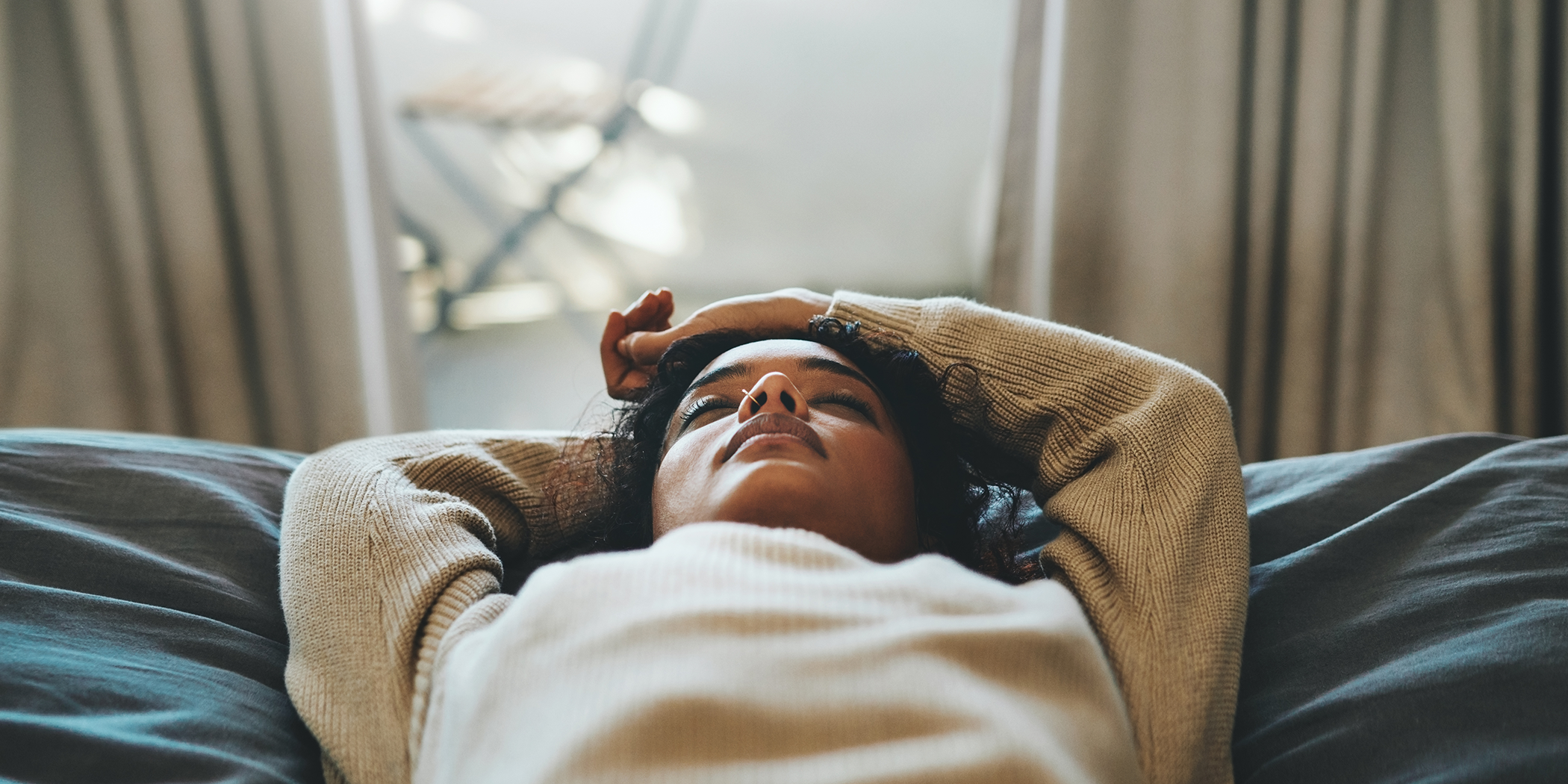
If you're a seasoned veteran of the gym or just been working out a few months, you've likely started seeing some benefits from exercise that you didn't expect. We all know that working out helps us look good and feel good, but it's not until we actually start doing it that we realize just how many hidden benefits there are. Your body is like an ecosystem. When one part is affected, it can have a downstream effect on all of the others. This can be true in a bad way, but also in a good way. Although the connection may not be obvious, exercise can have an important impact on our sleep. Today we take a look at some of the benefits of exercise for our sleep as well as recommendations for how to incorporate the best workout routine for your rest.
Article At-A-Glance
- Exercise and sleep are critical to a healthy functioning body.
- Exercise may help improve sleep quality.
- Exercise may increase slow-wave or deep sleep.
- Exercise may increase total sleep time.
- Exercise may improve sleep by lessening stress.
- Exercising outdoors may help improve sleep because of sun exposure.
- The best time of day to exercise for optimal sleep varies with each person.
- Lightweight body exercises, deep breathing and yoga may all help you get a better night’s rest.
Before we get into the specifics of how exercise affects sleep, let's review some of the basics of why exercise and sleep are important.
Why Sleep Is Important
Here are just some of the ways sleep impacts your health:
- Sleeping longer has been linked to greater physical and athletic performance in clinical trials.
- Getting adequate sleep (8 hours) can boost your overall immune function and help ward off common colds.
- Quality sleep can boost mental functioning and aid with problem solving and memory. The opposite is also true: poor sleep can impair optimal brain function.
- Lack of good sleep has been linked to weight gain in both children and adults.
Now, let's take a look at exercise...
Why Exercise Is Important
- Exercise may have mood-enhancing benefits. Working out can release positive neurochemicals that may leave you feeling happier and calmer.
- Exercise promotes energy. It oxygenates and sends nutrients to your muscle tissue. Regular exercise can also improve the efficiency of your cardiovascular system. The better your heart and lung health, the more energy you will have.
- Exercise boosts confidence by not only improving appearance, but also through goal-setting and accomplishments.
- Exercise can have a positive impact on brain function. Working out sends oxygen to the brain, which can benefit certain aspects of cognitive performance, including memory, learning and concentration.
As you can see, both exercise and sleep are critical to being healthy. But does one affect the other? As it turns out, exercise can have a major impact on your sleep in a variety of different ways. Here are some of the major benefits that exercise can have for your sleep.
Exercise May Help Improve The Quality Of Sleep
According to a large body of scientific research, exercise may have serious benefits for your body’s sleep function. When it becomes part of your regular routine, exercise may leave you feeling more rested and even help resolve insomnia-related issues. According to the Cleveland Clinic, a survey of 1,000 people indicated that 76% to 83% of those who exercise get good to 'very good sleep.' Of those who did not exercise, the number was much lower (56%)
Results from the same study showed that those who did not regularly exercise reported feeling sleepier. 24% of these participants were observed to be excessively sleepy using a standard screening measure. 61% of this group reported rarely if ever sleeping well throughout the work week (source.)
Exercise Can Help Increase Deep Sleep
According to an article released by Johns Hopkins Medicine, scientists do know that exercise increases slow-wave sleep. In case you’re unfamiliar with that term, slow-wave sleep refers to the period of ‘deep sleep,’ when the brain and body are able to repair themselves (source.) Dr. Greg Jacobs of Harvard University argues that our sleep benefits from the kind of stress that exercise puts on the body. Our body compensates for the extra physical exertion by increasing our depth of sleep. He also said that insomnia sufferers often deal with compounded issues because they are much more sedentary. He explains that a lack of movement can inhibit the body’s rise and fall of temperature rhythm (source.)
Exercise May Increase Total Sleep Time
In a large review of 38 studies examining the connection between exercise and sleep, a team of researchers found that exercise-related activities consistently increased total sleep time (source.) One simple reason for this is that exercise is demanding, and it not only requires more rest time of the body, it also prepares the body for sleep at the end of the day.
Another reason for this is related to what we discussed earlier about exercise and deep sleep. You may not realize this, but some phases of sleep are harder to come out of than others. In early phases of sleep, we may wake up easily due to noises, for instance. However, in the latter phases of sleep, it is much harder to rouse us. This is true of deep sleep. Therefore, one of the reasons why we may sleep longer when we exercise is because we spend a longer period of time in a phase that’s hard to wake from. A snoring partner, for instance, is far less likely to wake us up the longer we stay in deep sleep. This may partially account for why exercise causes us to sleep longer.
Exercise May Improve Sleep By Relieving Stress
One of the major contributing causes to insomnia and other sleep disturbances is stress. Although not all insomnia is stress-related, stressful events can often act as a trigger. Stress inhibits quality sleep by making it harder to fall asleep and stay asleep. It can also create hyperarousal, which is a state of heightened sensitivity and ‘fight-or-flight’ response. Hyperarousal can disturb the balance between sleep and wakefulness.
Scientific findings indicate that exercise may act as a buffer to stress. Those who get regular exercise may have a lower physiological reaction to stress, and thus have a greater ability to cope with it. In other words, people who exercise may be less affected by stress. According to the National Sleep Foundation, regular exercise may not only help physically active people deal with current stress, it may also help with future stress as well.
The Relationship Between Exercise, Bright Light, And Sleep
If you’re someone who likes to get out and move around, you might find that exercising outdoors has added benefits for your sleep. Exposure to sunlight helps regulate the body’s temperature rhythm, which in turn balances your sleep cycle. This could partially explain why camping outdoors has been shown to have a positive effect on sleep (source.) The more we get outside and in tune with the natural cycles of night and day, the more calibrated our sleep schedule becomes. Exercising outside may be a way to get the sun exposure you need to sleep well.
When Is The Best Time To Work Out For Sleep?
When it comes to determining the best time to work out for optimal sleep, there is no real consensus among experts. We do know however, that it appears to be highly subjective per each individual. Some people find that working out early prepares them for better sleep; others find that the time they work out has no real effect on their rest.
There is some anecdotal evidence that working out late at night may interfere with sleep among sensitive individuals. This may be for a few reasons. According to Dr. Stuart Quan, professor of sleep medicine at Harvard Medical School, exercise may cause a number of physiological responses that could disturb sleep. He stated that after people workout, “their adrenaline is high, their brain is active, and it’s difficult to wind down.” With that being said, however, not everyone experiences the same kind of trouble sleeping. Quan recommends that if exercising before bed does bother your sleep, give yourself a few hours between the end of your workout and bedtime for your body to normalize and relax. Overall, you may need to experiment to find what works best for you in terms of your exercise schedule and your quality of sleep.
Which Exercises Will Help Me Sleep Better?
So we now know that exercise can benefit sleep, but are certain exercises better than others? As it turns out, there are certain movements that can help prepare you for a good night’s rest. Here is a quick rundown:
Light Bodyweight Exercises — These exercises can be a great way to alleviate tension before sleep. Try doing a few light sets of sit ups, crunches or leg raises before bed. The key is to take it slow and easy: don’t get your heart rate up too high before bed.
Breathing Exercises — This is absolutely one of the best exercises you can do for your rest, and it’s super easy. To get the most benefit out of this exercise, do diaphragmatic breathing (breathing from the belly). Either lay down or sit up straight, take a deep breath (slowly), hold your breath for 3 seconds, and then slowly exhale. Doing this for even 4 minutes can have a dramatic impact on your state of mind and restfulness.
Yoga Poses — Most any yoga exercise will do before bed, unless you’re doing inversions (where your head is upside down). Yoga can help you achieve a state of mental stillness and quiet, which can dramatically impact sleep. If you really want to reap the benefits of yoga before bed, check out a practice called restorative yoga. Restorative yoga was developed specifically to help achieve a state of total restfulness. One of the unique features of restorative yoga is that you use props to hold your body in place instead of your own muscles. Restorative yoga centers around slowing down and opening up your body through passive stretching.
Final Thoughts On Exercise And Sleep
In our 21st century world of screens and deskwork, a good night’s rest isn’t always so easy to come by. Remember that for millennia, we as humans lived outside--moving and working all day. Nowadays physical activity is something we have to schedule or it often doesn’t happen. One of the results of our increasingly sedentary lives has been an increase in sleep disturbances.
If you’re embarking on a fitness journey and want to start exercising regularly, then you’ve made a great choice. Exercising can play a role in a healthy mind and body, and your sleep function is a part of that.








.png?width=1350&name=Procera%20Logo%20W%20Tagline%20White%20(3).png)
Comments
Add Comment